
Last week, I received a PDF presentation about “Helena,” a new startup boasting a 20-year-old Yale student CEO and connections—so they claim—to some of the most powerful and influential people in the world, from Stanley McChrystal to, uh, Selena Gomez. I spent the better part of last week trying to figure out what the company does—and I’ll level with you, man, I’m still not sure.
As far as I can tell, after having read the PDF deck (embedded at the bottom of this post, purportedly circulated by a PR rep working for Helena) multiple times, the company is a group of people who are doing something. That something appears to be “change,” although it’s unclear what they’re changing or how. The title card says this:
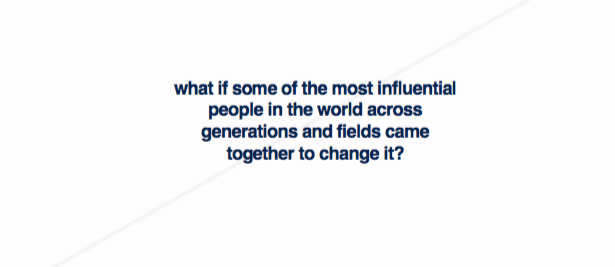
What if?
Some change is bad (when my parents got divorced) while other change is good (The Clean Air Act). Which kind of change would this be? Will this deck tell us? Join me on my quest to find out, won’t you?

On slide 2, we get some substance: Positive Global Impact, just the sort of thing Chloë Grace Moretz (left), star of the forthcoming film Neighbors 2: Sorority Rising, and Global War on Terror warrior-intellectual Stanley McChrystal (bottom right) know best. But “the group collaborates to create breakthrough ideas, then leverages its collective reach, strategic partnerships, and network to make them happen” doesn’t tell very much about what Helena “is” or “does.”
It all reads more like startup marketing lorem ipsum:
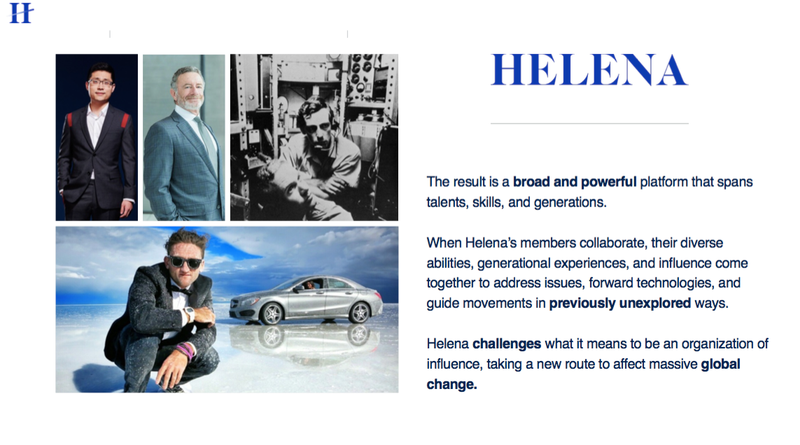
This may be airy nonsense, but it’s well-organized airy nonsense. Helena has “three integral pillars” to its name:
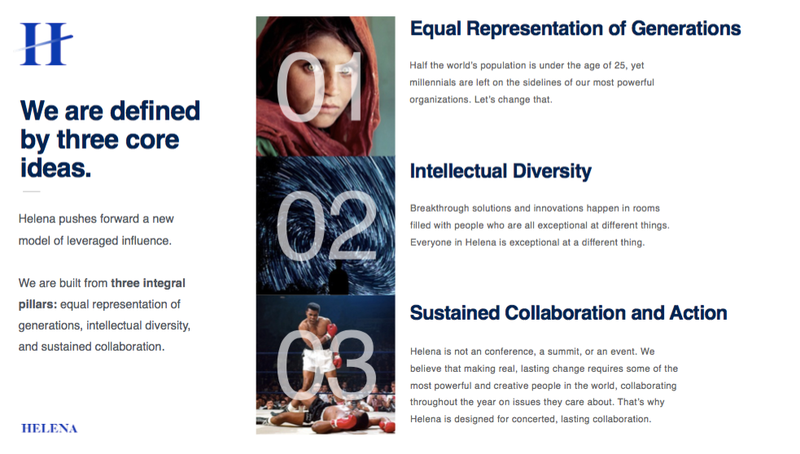
“Helena is not an conference, a summit, or an event,” we’re told. So then what is it? What does it do? What is one single thing it could do? Does it deliver food? Is it a band? Can it get me discounted tickets to Neighbors 2: Sorority Rising?
It’s now thoroughly cornball to joke that in Silicon America, all startups can be reduced to an “X for Y” formulation (e.g. Dropbox for Smells, Uber for Smallpox, Twitter for Cannibals). But that shorthand is useful, because tech businesses (and all organizations) should be able to explain what it is they do, their purpose for existing, in a sentence or two. A bakery is “a place that sells baked goods,” and Snapchat is “an app for sending pics and messages to your friends” I guess. A company’s purpose doesn’t have to be good, but there ought to be one, some understandable function, some definite activity of some kind, somewhere. I’ve covered startups on and off for a few years now, and have never found one that’s so apparently ineffable, whose explanation is so completely impossible. Even the founder of an app that did nothing but send its user a notification that said “Yo” over and over was willing to talk at length about his venture. Finding someone to tell me even the most basic concrete facts about Helena has been impossible.
On page 11 of the pitch deck, Helena is described as “a unique venture” that’s been “created to spearhead the next generation of thought,” and that is “amassing perhaps the strongest representation of world leaders under 25 for an organization of its kind.”
Nice, I love unique ventures, and you can bet Selena Gomez and the other world leaders under 25 do too. But how does it work?
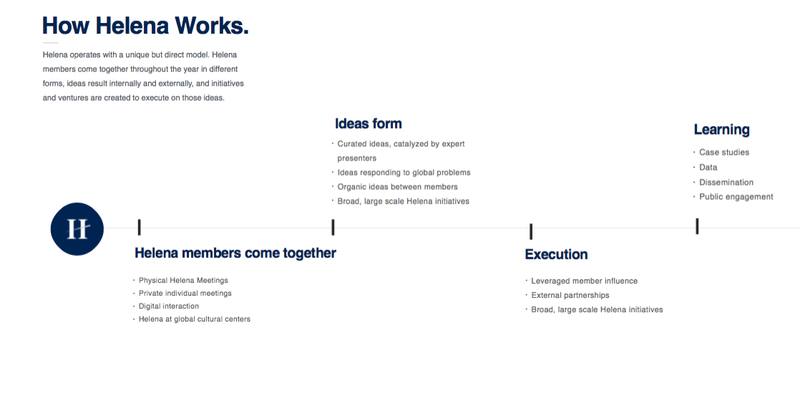
It goes something like this:
MEETINGS >> IDEAS >> EXPERTS >> PRESENTATIONS >> GLOBAL PROBLEMS >> PARTNERSHIPS >> LEVERAGE >> INITIATIVES >> DATA >> IMPACT >> ???
Can’t argue with impact, I guess. So who’s in charge of this whole thing?
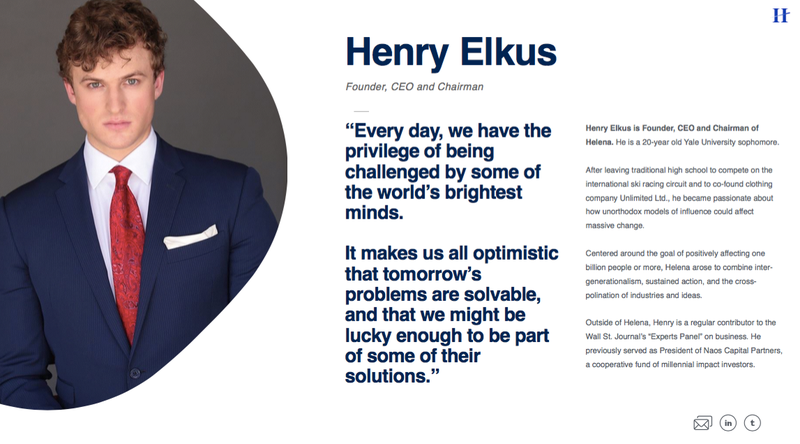
The “Founder, CEO and Chairman” of this Global Initiative Data Feedback Learning Impact Symposium is Henry Elkus, a 20-year-old Yale undergraduate.
Elkus is also the proprietor of a venture firm, Naos Capital, whose website consists of nothing more than an enormous photograph of the ocean and this blurb: “Naos Capital Partners is an international cooperative fund of millennial impact investors. We are a self-funded union of entrepreneurs, financiers and philanthropists reaching toward future markets and world conditions.”
How does a 20-year-old college kid come to be the CEO of an international startup and the owner of a VC firm? If his last name is familiar, it’s probably not just because he is the Founder, CEO and Chairman of the Helena Group, but because his dad is Bill Elkus, a successful venture capitalist (“one of the top 50 to 100 Venture Capitalists in the United States by Forbes Magazine in its annual Midas List on three separate occasions,” according to his website bio).
Dad is on the board of Helena, of course:
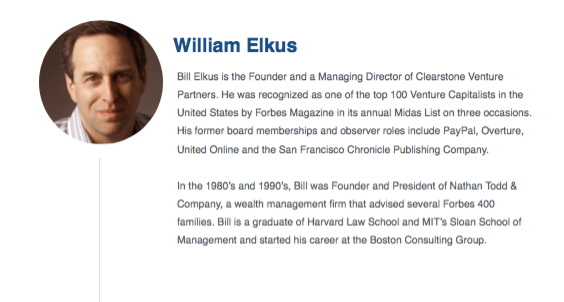
The Elkuses may not be the flashiest names on the PDF’s roster, but they’re the most important. Setting up your very possibly unqualified, too-young scion in the family business is a golden tradition among rich families, and one of the better perks of being born to a rich dad. And for all its bowing and weeping at the altar of meritocracy, nepotism is as rampant in Silicon Valley as it is anywhere else. Say all you want about having a great idea first or dropping out of college, but as it has been for the past several thousand years and will always be, having a rich dad is an excellent indicator of future success. Just ask Evan Spiegel, or Henry Elkus.
But let’s talk about those flashy names. We already met Moretz, Gomez, and Gen. McChrystal, and show business, media, and world figures including Deepak Chopra, Casey Neistat, and Brian Grazer are peppered throughout the presentation. These celebrities are rounded out by a roster of thinkfluencers and data-barons (billed as “members” or “advisers” of Helena) that reads like a TED-Talk key party guest list:
Divya Nag revolutionized the medical technology space before Apple appointed her to their secretive “Special Projects” division...Timothy Doner is the world’s youngest hyper-polyglot...Wade Davis is perhaps the most articulate and influential western advocate for the world’s indigenous cultures...Jennifer McCrea is a Senior Research Fellow at the Hauser Institute for Civil Society at Harvard University...
Those are indeed some impressive people with impeccable resumes. Strangely, in trying to figure out what Helena is, I found that some of the A-list names listed in this deck as being connected to Helena may not actually know that they’ve been touted as such.
My email to Jennifer McCrea about her role in the company was met with confusion: “This is Ariel, one of Jennifer’s business partners. I just checked with her and there is no connection. It must be a different Jennifer McCrea.”
Over email, I asked Selena Gomez’s publicist if she could explain her client’s role with Helena, to which she responded “I’ve never heard of this. What exactly is it?” I was not even close to prepared to answer that question. I tried to explain what Helena is, but because I do not know what Helena is, had trouble. “What exactly is it? Do you have a link for the site?,” the publicist asked. “I am trying to look into this and not having much luck as no one seems to be aware of it.” A dead end.
I asked Casey Neistat, cited as a member of Helena’s “brain trust,” about his role in the company. He answered only “not sure,” to which I replied “you’re not sure if you’re part of it or you’re not sure what it is or both.” He wasn’t even sure what it is.
Then, a day later, Neistat sent the following:
Are you talking about the Helena Group? Henry Elkus’ organization??
I’ve never heard it referred to as the ‘Brain Trust’. But the Helena Group is something I am a part of - been in contact with Henry for over a year on it.
So it is real—whatever “it” is.
A rep for Moretz was puzzled: “She is involved,” her publicist told me over email. “Trying to find out how.” Nothing further yet.
Two Helena “members” I contacted, Arjun Mehta and Nanxi Liu, confirmed that it exists, in some sense that might require a philosophy PhD to grasp, but informed me that they’d been told not to talk about it. It was beginning to feel like Helena was an elaborate hoax being played on me by some of my closest friends (Selena Gomez) and enemies (Stanley McChrystal, who has not returned a request for comment).
Henry Elkus, the CEO, founder, and chairman, also did not return a request for comment.
An email to Henry’s dad was bounced back indicating a defunct address.
Update: Clearstone Venture Partners, Bill Elkus’ firm, contacted me with a functioning email address, and I have contacted him with a request for comment.
In a state of desperation, I did the thing I swore I’d never do: I asked the company’s public relations team for help. Asking a corporate PR squad for simple, concrete, spin-free facts is an almost sadomasochistic experience, but what else was left? Helena is working with Rogers & Cowan, a bi-coastal firm that specializes in entertainment. Contracting a company to help you with your “message” is extremely expensive, which means there’s (A) a considerable amount of money at Helena—new, if not shocking information—and (B) some sort of message that needs messaging, maybe.
The first rep with whom I exchanged emails refused to speak with me on the phone, which as far as I know is a first in the history of public relations—I’ve literally had more success exchanging words with the communications office of the CIA. That very day, I saw that Helena had dispatched a press release announcing its existence, which I hoped would hold some clues. Maybe the press release would offer basics in layman’s terms, free from buzzwords and marketing schlock: (Emphasis added.)
Today, the launch of a first of its kind organization, Helena, was announced. Formed to spearhead a new generation of thought and action, Helena brings together global influencers to create positive world change. Half of the group is under 25 years old and half is over 25, marking a significant departure from prior efforts of its kind. EachHelena member also represents a different field, resulting in a powerful platform of diverse thinking and innovative solutions.
“Helena represents a new model for change,” argues founder Henry Elkus. “Tomorrow’s problems demand different kinds of solutions; we want to be prepared for that.”
“Helena is about making great people of different ages and experiences come together to create positive change on a sustained basis,” says Elkus. “Every day, we have the privilege of being challenged by some of the world’s brightest minds. It makes us all optimistic that tomorrow’s problems are solvable, and that we might be lucky enough to be part of some of the solutions.”
Half of Helena is under 25 because over half of the world is under 25. The millennial generation is influencing, innovating, and creating more rapidly than ever before. They are tasked with solving monumental global dilemmas, yet they are not given a representative voice in the world’s most powerful organizations. Breaking with this tradition, Helena establishes one of the strongest cohorts of young global influencers to date. The result is a unique bridge between generations and a powerful environment for innovation.
Come on.
Listed at the bottom of the release were three separate publicists at Rogers & Cowan, including the one who had iced me out before. A pleading call to the second went unanswered, as did my voicemail. Finally, I was able to reach the third Helena PR rep, who told me she would happily answer my questions.
“How do you pronounce Helena? Is it Hell-AYE-nuh or HELL-uh-nuh?”
“It can be pronounced either way.”
Not a promising start.
“What exactly is Helena?”
“It’s a non-profit organization that brings together a mixture of under-25 millennials that are accomplished, and over-25 year olds to collaborate on finding new approaches to issues and problems facing society and also to help the under-25 millennial generation have a greater voice and impact in business, civic life, social things...so that when strategy and plans are set, it’s not...the interests and needs of millennial generation are taken into consideration.”
What are some specific examples of “issues and problems” that Helena will address, somehow?
“The group has only just only started. There are a number of suggestions that the members have proposed that they are going to sort through and figure out which ones will be prioritized, and who will work on which specific projects together.”
“Where will they meet?”
“That has not been decided yet. They’ll definitely meet...virtually and together.”
“How often?”
“I do not have the answer to that one.”
“What exactly does Helena do to facilitate these ‘meetings’? Anything?”
“I do not know.”
“Will Helena generate money?” This one prompted a sarcastic reply: “When you have staff and office space you do need to fund your operation, so that’s given.”
Staff and office space!? “How will the revenue be generated, exactly?”
“I’ll put that on the list [of questions] to pass through.”
“Is there any investment money in Helena yet?”
“They do have initial seed funds to help get the organization rolling. I honestly don’t know [where it came from].”
A few days later, this same Rogers & Cowan rep forwarded me a response from Sam Feinburg, another Yale undergrad and Helena’s Vice President, that was supposed to contain exact answers to my specific questions. Other than the helpful clarification that Helena is legally incorporated as a non-profit, I got more than mush: Helena’s mission is to “create positive impact across the globe,” is funded by “significant personal capital” from 20-year-old Henry Elkus, and “thus far, we’ve been awed by the bonds of friendship and collaboration Helena Members have begun to make in advance of their first meeting.” Feinburg added some clarification on the group’s name:
Dr. Martin Luther King said “darkness cannot drive out darkness; only light can do that”. We were inspired by his example and named the organization for it - Helena means “bright, shining light”. We’ve brought together some incredible people who care deeply about the world in the hope that, together, we can improve it.
Three days later, an article ostensibly about Helena on Inc. surfaced after the author “sat down with Helena Founder Henry to get six top tips on how to build and sustain powerful relationships.” No great truths were revealed, unless “Be Wrong,” “Gain by listening,” or “Stop the meeting when it’s over” are revelatory to you. How could an article about something make you understand that something less? Helena appears to be less a philanthropic startup than a buzzword vortex. Which is to say they’ll probably do very well. They have mystery seed funding and a deck. They have a staff of publicists. They have a handsome founder who can blow smoke up Inc. Only the few, the special, and Selena Gomez know what they do—but when has that ever mattered? We’ve been promised “impact.” Everyone loves impact. Henry Elkus will prosper.